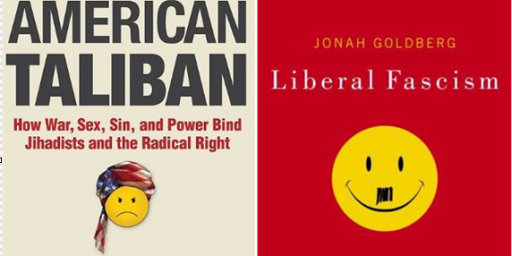Markos Moulitsas and the Libertarian Democrat
Over at Cato Unbound Markos Moulitsas attempts to make the case as to why Libertarians should vote for Democrat Candidates next month. The reason I say he attempts to make this case is because he basically wants people who have a strong libertarian streak to think that up is down and black is white.
Moulitsas starts out by quoting Kos diarist, hekebolos,
Up until even very recently, it was still definitely possible to construe government as [the] largest threat to individual liberty. It wasn’t very long ago that “what was good for GM was good for the USA.” Government regulation of corporations was seen as interfering with the prosperity of the average American. You see, the libertarian/conservative idea behind the primacy of the free market was that there would always be an intersection between what was good for business and what was good for the consumer. But that correlation was far greater in years past than it is today.
The fundamental reason that “libertarian” has become “libertarian democrat” is that corporations are becoming more powerful than governments. This fundamental fact has created a union between those with libertarian tendencies and those who believed all along that government can be a force for good.
[snip]
This list, I’m sure, could be added to. Oil and oil services companies can even dictate when and how the most powerful nation on earth decides to go to war. A cabal of major corporate industry is, in fact, more powerful than the government of the most powerful nation on earth—and government is the only thing that can stop them from recklessly exploiting the people and destroying their freedom.
There are two problems here. The first is that even if this notion is true that corporations are becoming more powerful than governments, but that government is the only thing to stop the rise of corporations, then it must be the case that governments are still more powerful that corporations and have a great deal of coercive powers. Hence it doesn’t fill me, and I’m fairly sure other libertarians/minarchists, with much comfort that we are going to expand that power especially coercive power. The second problem is even more problematic. I would argue that one reason why corporations are so large and powerful these days is precisely because of the expansion of government. We can see this in the following quote,
As hekebolos further noted, defense contractors now have greater say in what weapons systems get built (via their lobbyists, blackmailing elected officials by claiming that jobs will be lost in their states and districts if weapons system X gets axed). The energy industry dominates the executive branch and has reaped record windfall profits. Our public debt is now held increasingly by private hedge funds. Corporations foul our air and water. They plunder our treasury.
Why are defense contractors powerful? Because of their lobbyists and blackmailing of officials via job loss. Why are energy industries rich and powerful?1 In both cases the answer is that government is not only large but easily influenced by corporations. That is, it is the very expansion of government into so many facets of our economy that has made government vulnerable to control by corporations.
I will grant Moulitsas just about everything (heck I’d even be willing to grant him everything) when it comes to the failure of Republicans to hold true to even some of the principles that libertarians consider important.
We can fondly look back to a time when Republicans spoke a good game on libertarian issues. They professed fealty to state rights, spoke of shrinking the government, preserving individual liberty, and embracing fiscal responsibility.
Moulitsas is absolutely right to note that on all these fronts the Republicans have been abysmal failures. However, the question still remains: why should libertarians turn to the Democratic party? As I noted in this post, if anything Bush is very much like a “Democrat-lite”. Back then I wrote,
Other than cutting taxes and the war in Iraq and on terrorism, President Bush is a liberal. That is the bottom line. Calling Bush a conservative is, in my opinion, an insult to conservatives.
To that list I’d add abortion and homosexuals (with stem cell research being a sub-catagory of abortion). So, if I don’t like Bush, why should I or any other libertarian vote for a Democratic candidate? Seems to me we’d end up getting precisely more of what we are unhappy with in President Bush.
Moulitsas then moves on to embracing the market and tells a story that if anything doesn’t help his cause any either.
In the waning years of the Clinton Administration, the Justice Department waged a massive anti-trust battle against Microsoft. At the time, Microsoft seemed unstoppable, a monopolistic behemoth who would either swallow or crush anyone that posed even the most minute threat to its business. I cheered the Justice Department on, thinking its efforts would be the only thing to dent the prospects of a Microsoft-dominated world. I was despondent when Microsoft emerged victorious. Innovation seemed dead. But I was dead wrong.
What a difference a few years made. As the Internet came on the scene, first Yahoo then Google transformed the technological landscape leaving Microsoft in their wake. The market shifted, and Microsoft wasn’t able to make the transition. Despite being a dominant player in PCs and office software, no one fears Microsoft anymore. It is a remnant of a different era, reduced to providing commodity products as other companies blaze new trails. The market worked on its own.
Seems to me that if the above story is true (I don’t know as I didn’t follow the Microsoft anti-trust case that closely) it says that the government basically wasted all those resources pursuing the anti-trust case against Microsoft as the market changed and displaced Microsoft from its position of dominance. So, as libertarians, are we to support bigger government so we can have government waste money that makes Markos Moulitsas feel better? Seems like a very weak argument indeed.
Moulitsas continues and overstates his case withe the following.
My libertarian tendencies have always found a welcome home in the Silicon Valley culture (and in all of the nation’s great technology centers). It is a place where hard work and good ideas trump pedigree, money, the color of one’s skin, nationality, sex, or any of the artificial barriers to entry in most of the rest of the world. It is a techno-utopia that, while oft-criticized for a streak of self-important narcissism, still today produces the greatest innovations in technology in the world. Where else could such a motley collection of school dropouts, nerds, brown people (mostly Indian), and non-Native English speakers (mostly Chinese), not just rise to the top of their game, but dominate it? This is free market activity seemingly at its best, and it works precisely because these individuals are able to take risks and be judged by the results of their work, rather than be judged by who they are, where they’ve been, or who they know.
But there are other reasons why this outpost of libertarianism works. The government has put in an infrastructure to support the region including, among many other things, roads, the Internet, government research grants, and the most important ingredient of all: education, from the lowliest kindergarten to the highest post-doc program. Such spending, while requiring a government bureaucracy that makes a traditional libertarian shudder, actually provides the tools that individuals need to succeed in today’s world. If our goal is to promote and champion individual liberty and the free market, we need government to help provide those tools to all Americans, not just a privileged few. This isn’t a question of equality, it’s one of opportunity. Some people will take advantage of those opportunities, and others will not. That will be up to each individual. But without opportunity, there is no freedom.
Granted, the government did play an important role here. The internet, is very much like other goods that most libertarians see as the rightful sphere of government: public goods. One could even make some case for various types of government funded research as information is very much like a public good in that when one person consumes that information (i.e. learns it) it does nothing to diminish another person’s ability to consume that very same information. But the government also greatly hampers the spread of information via copyrights, patents, and other forms of intellectual property protections. David Levine and Michelle Boldrin have argued that such protections are very much the type of monopoly, even worse IMO as these monopolies are state sanctioned, that Moulitsas decried in the opening of this section. To say that Moulitsas is very muddled on this issue is a pretty substantial understatement.
From there Moulitsas continues to overstate his case,
There is also no individual freedom if corporations aren’t forced to provide the kind of accountability necessary to ensure we make proper purchasing or investment decisions. For example, public corporations are regulated to ensure that investors have accurate data upon which to base their trading decisions. If investors can’t trust the information given by corporations, the stock markets couldn’t function. If the stock markets couldn’t function, our current market system would collapse. Matters such as deceptive advertising, labeling, and some safety regulations are also important. Does anyone doubt that requiring food companies to label ingredients and nutritional data doesn’t enhance our liberties by giving us the information we need to make informed decisions?
First off, there were stock markets long before there were entities like the S.E.C. Further, things did not cease to exist, but they probably were more volatile than they are today. However, there is grain to truth here: governments to help minimize informational asymmetries that can cause bad market outcomes. Still, if we had a government that provided just these types of services, national defense, and a few other “basic” services seen by many libertarians as the legitimate role of government we’d likely see a government smaller by several orders of magnitude. For example, when information came out about transfats was there any legislation enacted to have them removed from things like Doritos? Not that I’m aware of, but in looking at the ingredients on the last bag of Doritos that I bought, it says right on there, “0 grams Transfats”.
In short, the only reason that I can see for a libertarian minded person to vote Democrat is because they aren’t Republicans and to try and “send a message” to Republicans that the libertarian vote is not a sure thing, so stick to your small government claims. However, that strikes me as rather unpalatable given that it is like cutting off your nose to spite your face. Personally, I see no reason to change my plans for the next presidential race. Getting out a bottle of Lagavulin, drink till I can barely walk. Then stagger over to the polling place (thankfully right around the corner from my house) and vote for Lyndon H. LaRouche. Seriously, I think anybody with a strong libertarian streak would be best to vote for neither the Republicans or the Democrats, and instead vote for a libertarian candidate or some other candidate they find agreeable.
Update: Zen Politics has a couple of great quotes regarding Moulitsas’s essay,
First is that his post/essay basically says “Look, ‘new’ Democrats and libertarians have a lot in common, except that you need government instead of the market to do this, this, this, this, this, this, this, this, this, this, this, this, this, this, this, this, this, this, this, this, this, this and this.” He also makes the classic Democrat mistake of only seeing personal liberties in the context of being a consumer of business, and not personal liberties in the running of a business, and expects libertarians to say “Thank you sir, may I have another?”
Precisely right. Further, even the areas that Moulitsas highlight in his article the government does them vastly differently than a libertarian who agreed with Moulitsas would suggest. As I noted above, fine the FDA can be useful as a clearing house of reliable information on drugs, foods and so forth. I strongly suspect that isnt’ how Moulitsas would see it.
No, I think Kos is out to win the next election and sees libertarians as a convenient way to leverage a few votes. As soon as Democrats can regain power they’ll forget about us, and all libertarian principles, as quickly as the Republicans did in 2000.
Color me cynical, but I think this is exactly right.
_____
1I should note that I think Moulitsas is off the mark here with regards to energy companies. Exxon Mobil, one of the largest private corporations in the world, as well as one the largest energy companies in the world, produces and controls on a teeny tiny fraction of oil. Even using whatever pull it has with government is likely to have little effect on global prices. For example, one reason why oil prices are so high are the expanding economies in India and China. Does Moulitsas really want us to believe that the Bush Administration is actually behind the impressive growth in the Chinese economy for the simply reason that Exxon Mobil and other oil companies can have record profits? If this is indeed the case, then Moulitsas and the Democrats might as well as give up on elections and spend do something that they can be successful at.






Is losing really *that* hard? Especially when your team has been admittedly crap at the game during the last season? Just let it go… better times will come for sure! It’s the “Dems” turn, let them **ck up their chance and be smug and happy back sometime in 2008/10. But as for now: just let it go.
‘There is also no individual freedom if corporations aren’t forced to provide the kind of accountability’
WTF? Can there be like a guideline that no one should write or talk about ‘libertarian’ stuff unless they have the slightest idea what the word means?